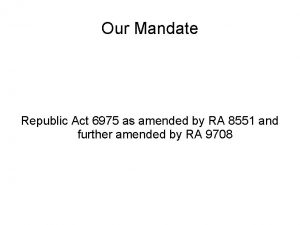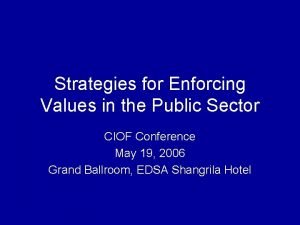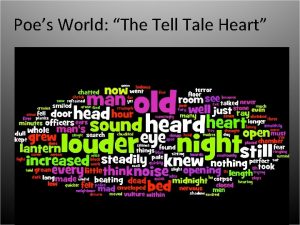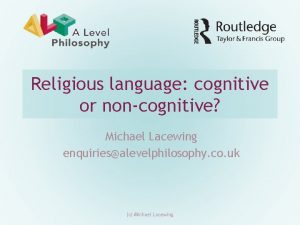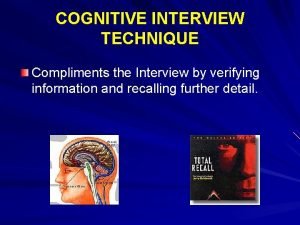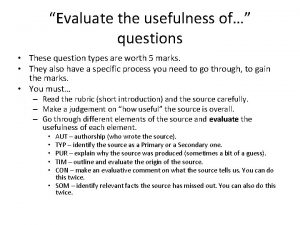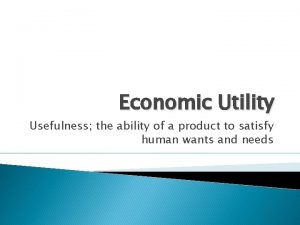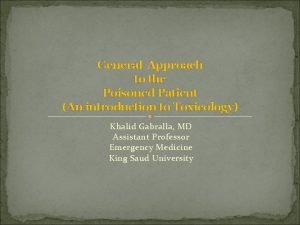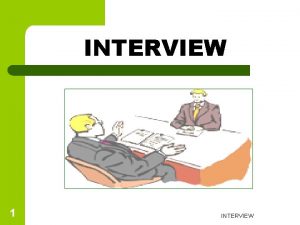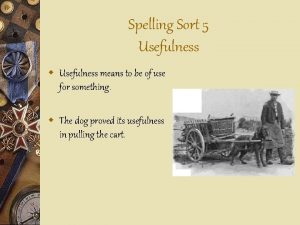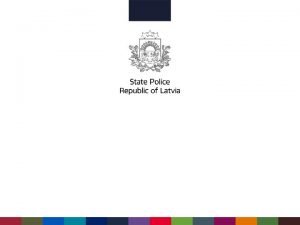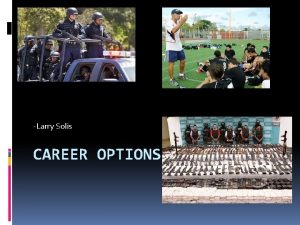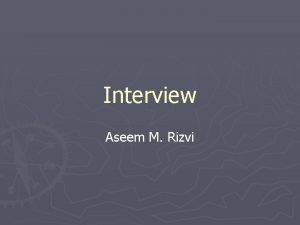Police officers perceptions of the Cognitive Interview Usefulness














- Slides: 14

Police officers’ perceptions of the Cognitive Interview: Usefulness, confidence and witness reliability. Dr Jacqueline Wheatcroft (University of Liverpool) Professor Graham Wagstaff (University of Liverpool)

Introduction n The Cognitive Interview (CI) is the standard guideline for interviews employed by the UK police service in helping witnesses to remember. n Nevertheless, since its emergence as a potentially useful forensic tool in the 1980 s, numerous commentators have raised issues - with reference from, for example, its use and applicability to a wide range of witnesses (Memon and Higham, 1999) to its lack of ‘operationally friendly’ format (Kebbell & Wagstaff, 1999). n Previous research has shown reinstatement of context to be most used component of the CI (Clifford & George, 1996) n However, while the CI is ‘sporadically’ commonplace – anecdotally, it seems the practice may be affected by officers’ perceptions and understandings. Thus, it seems timely to explore police officers’ perceptions to determine notions of usefulness, which in turn may impact upon efficacy and administrative ease. n The aim of the study reported here was to examine the perceptions of ‘Enhanced’ (T 3+) CI trained officers that use the interview techniques in their interactions with witnesses.

Method n A questionnaire was constructed and consisted of items relating to the examination of: 1) Standard Interview (SI) and 2) Cognitive interview (CI) ¨ Relative to a range of witness types, which included children under 6, children over 6, adults over 60, and adults with learning difficulties. ¨ The items asked for opinions and ratings on a range of aspects that included: a)the usefulness of witness interviews b)reliability of witnesses c) the usefulness of specific components of the CI (i. e. report everything, reinstate context, change order, change perspective; and the idea of build rapport). Police ‘rank’ and ‘time served’ in the service were also explored to illuminate any other aspects that might influence ‘uniformity of procedure’ and/or ‘witness differentiation’. The questionnaire was distributed to three different Constabularies in England/Wales of which thirty-four (special advanced interview unit) officers completed the questionnaire. 63% were Male and 37% Female. Mean service length = 16 years and service ranged from 2 -31 years.

Rationale n Clearly the CI has provided for a device with potential application to a wide range of situations and witnesses. n However, previous research (Dando, et al. , 2008; Dando, et al. , 2009; Kebbell et al. , 1996) and anecdotal evidence suggests that interviewers may still may not necessarily be aware of the maximal effectiveness of CI components. Furthermore, that officer experience may be relevant. n This study sets out to explore and investigate with the following hypotheses in mind: ¨ The most useful CI component reported will be ‘Reinstate Context’ while the least useful will be ‘Change Perspective’, perhaps, illustrating Research Informed Practice. ¨ Service length will have significant effects upon ratings of CI usefulness, confidence in conducting interviews, and reliability of witnesses ¨ Frequency of CI use will positively impact upon perceived usefulness of CI components

Means and SDs for police officers’ perceived usefulness of CI components x witness groups

Means and SDs for police officers’ confidence and perceived usefulness ratings for (SI) and (CI) x length of service

Means and SDs - police officers’ ratings of perceived usefulness of CI components X frequency of CI use

Means and SDs for police officer’s perceived witness reliability ratings X length of service

Means and SDs - police officers’ perceived usefulness ratings for CI X rank and X type of witness

Key Points n The data shows that officers who have longer service are more confident in conducting the CI than those with longer service. n Officers perceive the CI to be most useful with adults and least useful with children <6. And further, that adults are the most reliable and children the least reliable witnesses. n According to this study, police officers’ perceptions of the usefulness of the CI do not appear to sit comfortably with current research on the effectiveness of CI components. n Importantly, officers, regardless of how frequently the CI is used, perceive the ‘building of rapport’ and ‘report everything’ as most useful. Conversely, research suggests that context reinstatement’ is SINGULARLY the most effective mnemonic for use in witness interviews. n Arguably, this problem might be overcome with more detailed psychological education; though, this is expensive and operationally problematic. n Thus, it is argued here that officers require a simpler ‘interview friendly’ protocol that uses ‘known and empirically tested’ effective CI elements (see presentation tomorrow – Wagstaff & Wheatcroft)

Challenges n Overcoming length of service effect in respect of confidence – could begin by simplifying ‘early’ training - via experiential learning such that officers: Focus on ‘experience’ offerings with different witness types (earlier in career) ¨ Focus on basic and effective techniques ¨ n (see Wagstaff/Wheatcroft) This, in turn, may increase perceptions of componential and technique effectiveness with more poorly ‘perceived’ / understood witness groups (e. g. high functioning autistics – see paper by Mulcahy/Wheatcroft/Alison) n Lower our (psychologists) expectations of police interviewers?

The Problem n Research suggests that CR is one of, if not, the most effective components of the original CI ¨ n Going Forward n (Milne & Bull, 2002; Memon & Bull, 1991; Memon & Higham, 1999; Hammond, Wagstaff & Cole, 2006). …… and previously had been reported as the most widely used ¨ & It is accepted that there is still a need to identify methods to enhance memory and eliminate ”redundant techniques” to aid the procedure ¨ n (George, 1991; Clifford & George, 1996). A viable alternative in time-constrained situations is ‘still’ needed ¨ n According to the advanced police interviewers in this research – the CR component was not considered to be the most useful and thus may not be the most widely used ¨ (supports previous work by others such as Clarke & Milne, 2001; Dando, Wilcock, Milne & Henry, 2008) (Milne & Bull, 2002: 744; Dando, Wilcock & Milne & Henry 2008). (Kebbell et al. , 1999; Milne & Bull, 1999, 2002). n Both memory enhancement protocols and the provision of a ‘workable’ uniform procedure that is less cognitively demanding is necessary

Outcome Potential n A simple protocol could be introduced more readily to short service officers in daily practice (and across witness types) to build confidence n Prepare officers for more complex interviews in later career development n Production of Guidance Booklet for use in the operational context that officers can easily follow and integrate into daily activity ¨ n (see Wagstaff & Wheatcroft) Could result in the lowering of expectations of officers to ‘become psychologists’ (anecdotal commentary) – building confidence and capability

Summary n We all know that the CI has revolutionised police practice when interviewing witnesses. n This paper supports evidence which suggests interview protocols are at risk of differentiated application; ¨ n What is evident is that the potential for protocols not being applied as originally intended still exists and that this has implications for specialist interview training. ¨ n i. e. that some componential aspects of the CI seem favoured by officers for use, above others, (based on their beliefs around their usefulness and perhaps ease of administration). i. e. time is best spent on those components that research shows to be most effective together with ways of working that officers find useful to articulate and integrate into daily activity, and earlier in their career. This paper merely seeks to reaffirm the real need for a shortened protocol that is effective and provides for an integrative solution in police interview practice.
 Police officers pledge
Police officers pledge Canton police department records
Canton police department records Pnp pledge
Pnp pledge Police officers pledge
Police officers pledge The tell-tale heart police officers perspective
The tell-tale heart police officers perspective Cognitive and non cognitive religious language
Cognitive and non cognitive religious language Cognitive interview definition
Cognitive interview definition Memory psychology a level
Memory psychology a level Importance of decision usefulness theory in accounting
Importance of decision usefulness theory in accounting Evaluate the usefulness
Evaluate the usefulness Properties of matter useful and harmful materials
Properties of matter useful and harmful materials Example of form utility
Example of form utility Usefulness of iron
Usefulness of iron Information approach to decision usefulness
Information approach to decision usefulness How to answer source based questions in history
How to answer source based questions in history
